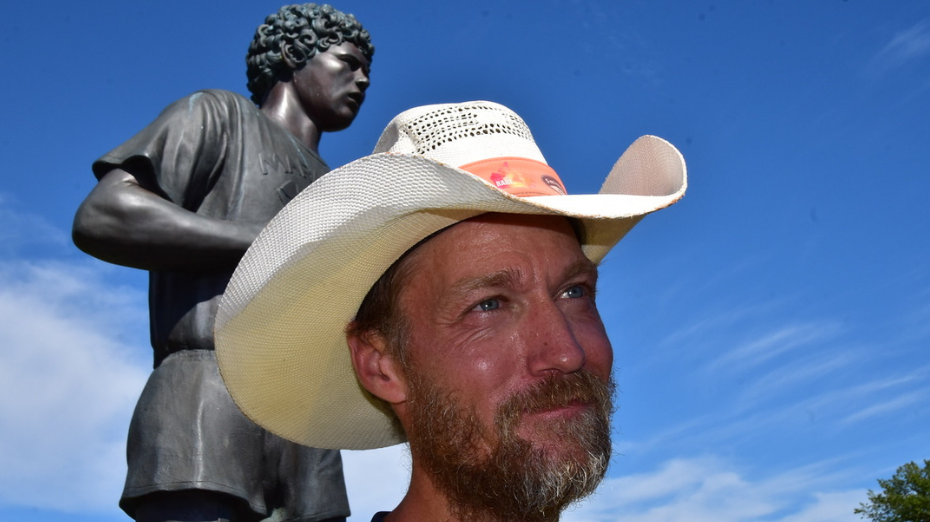Photos courtesy of Dave Proctor.
The routine was established — wake early, chug oatmeal, yank on sneakers, tug on cowboy hat, hammer out 100 kilometres.
Every day, Dave Proctor did this. For 67 straight days.
The Okotoks ultramarathoner traversed Canada in record-breaking fashion, beating Al Howie’s 72-day trip.
And if racing coast to coast on foot sounds like an arduous challenge, well, it is. Proctor attempted the feat in 2018, but, loping eastward from Victoria, he petered out in Manitoba because of a ruptured disc in his back.
This time — starting in St. John’s, N.L., striding daily from May 15 to July 21, wearing out 12 pairs of runners over 7,159 kilometres — his six-foot frame endured, even it shed 17 pounds.
“It turns out to be an even bigger country than I thought,” said Proctor, a 41-year-old massage therapist. “But almost everything went according to plan, which is amazing.”
The unforgettable nine-week adventure included a likely case of COVID, a probable concussion, daily soul-baring updates on social media, hundreds of pavement-pounding hours, a never-ending interior dialogue.
A week after reaching Victoria, Proctor happily shared his thoughts about the life-making experience.
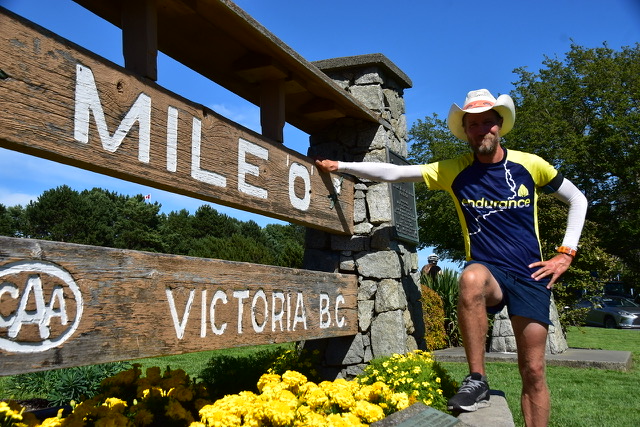
It’s been eight days since you completed your mission. I’ve heard you’re in an air cast. Right now, how are you feeling physically?
We’re waiting on a bone scan, maybe an MRI — there’s something funky going on with my foot and ankle. Overall, the whole body is kind of shot. The mental system. The emotional system. It’s like a severe trauma you put yourself through.
After completing 100-mile and 24-hour races, you’ve talked about the emotional drain. So, after 67 days, what’s it like?
It’s been pretty well documented (the letdown for) people who go out and win a gold medal at the Olympics. For me, this is my gold medal at the Olympics. This has been a life-long dream of mine — I’m just so overwhelmed. On the other hand, you have this extreme high. Then, the way the dopamine system works in the body, you have an extreme low. I don’t know exactly what to think of all this. All I know is that I’m really, really tired and to not over-think my feelings right now, to give myself time.
Coming down off of this, you drink your same coffee, you garden in the same garden — really, the world hasn’t changed, outside of the fact that you achieved a goal. We expect the world to be different when that once-in-a-lifetime thing happens, right? You win the lottery, but the next morning you’re still you. So I think I’m kind of going through that right now.
Since finishing, have you been sleeping 12 hours a night? Or is it maybe tough to sleep?
It’s tough to sleep. The best way to put it is when I was running I didn’t create any space for anything outside of the task at hand. So there was almost no reflection. Now I have time to reflect and it’s when I put my head down on my pillow at night. Then your brain starts going places about the people that you met, the places you saw, the experiences you had, good and bad. It’s a hell of a story — it’s a long story — and that’s just coming back to me.
I was sending out text messages at 3 o’clock in the morning last night because I wasn’t sleeping. It’s easy to say, “Dave, night isn’t the time to reflect. It’s time to reflect in the morning.” But, still, your brain will do what it wants to do.
Beyond the foot and ankle issues, how is everything else? Knees? Back?
Everything’s tight. It hurts. I’m achy. I had a massage yesterday. He’s an incredible therapist, but sometimes an area doesn’t want to be open yet. And I got home and it was, “Oh, no. My hip flexor is locking down.”
It’s basically like this motherboard and all the wires got tripped up and you basically don’t know what to do, physically or mentally or emotionally. Sometimes you’re really happy, but you start crying. Sometimes you’re really sad, but you start laughing. It’s a weird place to be. But we all know when we physically do something hard, you’ve got to give yourself time to recover because we understand that physiological model.
But what about the brain? What about the endocrine system with your emotions?
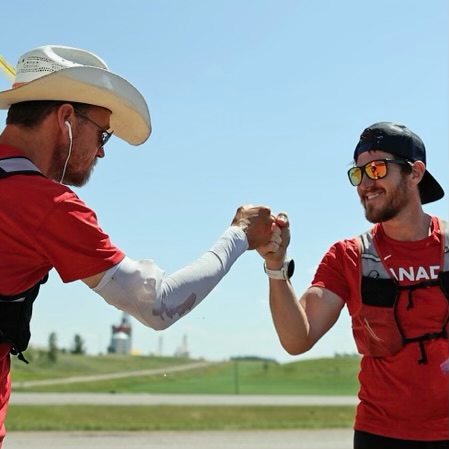
Short-term, what’s next for you? What’s the rest of the summer look like?
There’s some body care that needs to occur. I’ve got (Big’s Backyard Ultra in Bell Buckle, Tenn.) in October, but I don’t know if it’s going to happen. Which is a shame because I’ve developed this fitness base and I’d really like to use it. But if the body says no, the body says no.
I know one of my dream races is the Spartathlon in Greece. I’d love to go run that and do well there. I forget the guy’s name — Pheidippides? He’s the one who ran 246 kilometres to tell the general of the army (of the Greek victory), then he fell over and died. It’s that exact route that he ran, which is so cool, right?
In terms of goals, is there another headline-making blockbuster in the works?
I hate to say it, but this is enough. It doesn’t get bigger than going 105 a day for 67 days in a row. At what point do you stop inching up? But there’s different things in running — multi-day running or bettering my 24-hour (records) or even going after the 100-mile Canadian record.
I can sharpen my knife in different ways.
Everyone can appreciate the physical demands of running across Canada. But mentally, especially in the first couple of days, knowing that thousands and thousands of kilometres remained, did you carry that weight with you? Or were you able to stay in the moment? The old one-day-at-a time thing?
There’s a mindfulness concept that I did really well at, which is non-striving. I know it sounds ridiculous when you’re running and racing because there’s a finish line you’re striving to get to. But the best way to get there sometimes is to be here — to not focus on where you need to be, but just be in the moment and be present and be within that breath. Or take a look over at the beautiful nature next to you, look amongst the trees, the valley. Just being present and not getting ahead of yourself was huge.
I was very, very fixated on this. Not once did I ever think I was going to quit. I definitely thought, “This is hard. I’m really tired,” but never was there a tipping over into a defeatist mentality. Sometimes, I needed two extra minutes at the crew vehicle to get my bearings, but there was never a quit button.
For something like this, the first 10 days are really, really hard. When I was training, I was running 250 kilometres a week, which is a lot. But the first week was 735 kilometres — followed by another one and another one and another one. You did nine of those back to back. Believe it or not, the fitness builds throughout. So the fifth week is a lot easier than the second week. Until you hit that final week and it’s, “OK, that’s enough.”
But that first week is by far the hardest because your body and your mind are screaming at you to stop — “What are you doing?” We are self-preservation machines. That’s one of the reasons we’re the dominant species on this planet — because we always choose survival over reward. When things get hard, we typically turtle as human beings, and that makes us survive. We typically don’t take risks. We typically don’t do hard things. And that’s one of the beautiful things about ultramarathoning.
Things were ugly in the first week — really ugly. I had a virus. I tested for COVID and I didn’t have COVID — but there’s no way I didn’t have COVID. My girlfriend (Lana Rae Ledene) tested positive and the film-maker tested positive. I had to run through that and it was not easy. The whole mental piece (of saying to yourself), “Stop, stop. What are you doing?” And, at the same time, you can’t really take deep breaths and you’re coughing up blood and your temperature is through the roof and you’re not sleeping at night. I came to realize, if I can get through that, I could do anything.
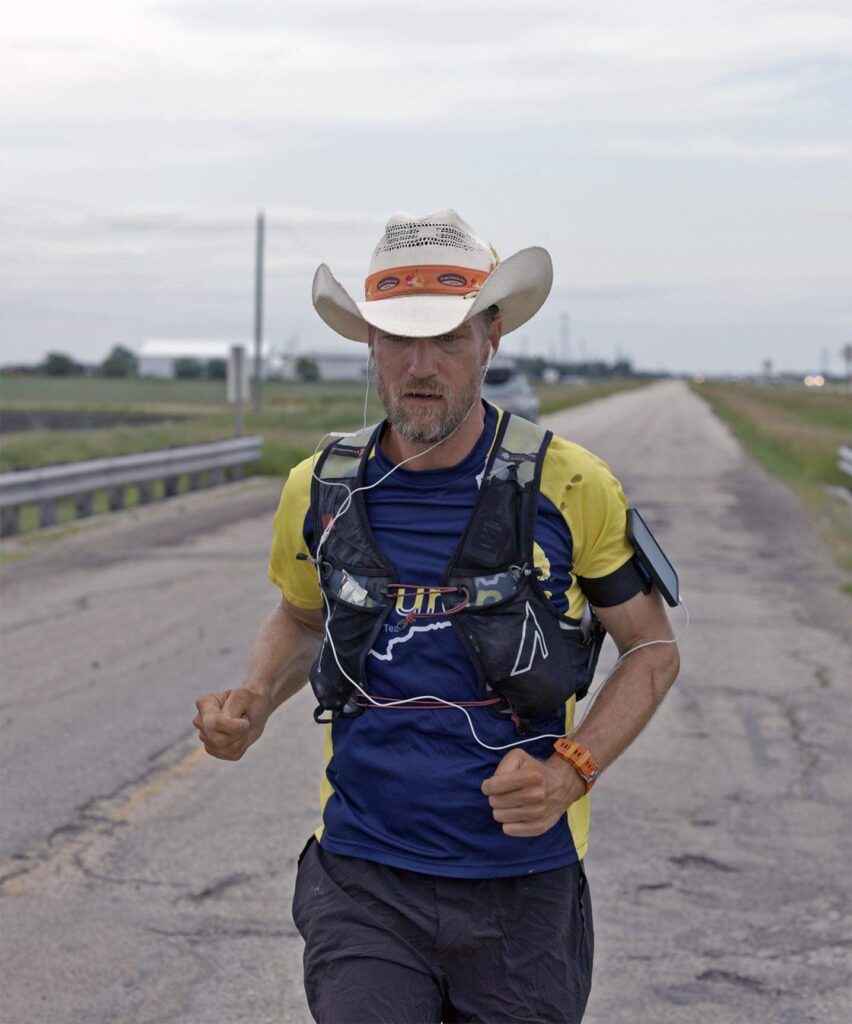
Fifteen or 20 years ago, we wouldn’t have been getting daily updates about something like this. But, via Facebook and Instagram (@runproctor), you were faithfully posting. Why was that important?
I think there’s a lot of people, if I were to be successful, who would take a lot of positives from something like this and use some of those little key things that worked for me — or didn’t work for me — in their lives.
I would do some walk breaks at the end of the day … and I would start typing what was on my mind. Those were my daily social posts. I poured my heart and soul into that post. For whatever reason, people really seemed to connect with it, I think because people connect with people. To know that I’m not a machine out here. I’ve got fears and concerns and worries and doubt — all the things that they have, too — and it makes the whole thing relatable.
Through the magic of social media, we were able to see photographs of the bloody aftermath of the tumble you took that day in Ontario.
You could see the bone. It was pretty gnarly.
It was around mid-day. My crew member Matt Shepard, a dear, dear friend … was running with me on an overpass in the middle of nowhere. It was weird footing on the shoulder and he said, “Oh, man! Look at that over there.” Next thing I know, I’m saying, “What the hell just happened?” He said, “Man, you just fell and hit your head hard.” I lost consciousness. It took me five minutes to say, “How far away is the (crew) car?” He said, “One kilometre.” So we ran the kilometre. Then I assessed … “OK, let’s take our time.” (Making do with butterfly bandages) we kept running and all the blood dried. We did the full day and it took about two and a half hours longer than it should’ve.
Recovering from a complex concussion, the No. 1 thing is rest. But I can’t rest because I’m in the middle of a speed record. The biggest symptom … my mental state. I was very easily triggered. Something that Matt said, something that Lana Rae would do, and I would just snap. Or loud noises on the road because you cannot escape that … when the vehicles would drive by, sometimes I would just start screaming and yelling at them, like a child throwing a temper tantrum.
I was reminded by my sports psychologist, “Dave, that’s your limbic system. And it’s not intact right now. You have to remember that your brakes aren’t working. Take a deep breath. Don’t be mad at the motorcyclist that just went by. Just relax.” It took some extra energy to stay cool.
Definitely, followers got a kick out of your daily social-media post — “Ditch Find of the Day.” Whose idea was that?
Running 105 kilometres a day, most people can’t relate to that … but what is hilarious is all the junk you find in the ditch. And (before I started in St. John’s) Lana Rae said, “Just keep your eye out.” So I’d stop and take a photograph. I think I have 300, 400 photos on my phone. It was her idea and it was brilliant because it was fun. People would log on and say, “Oh my god, that’s weird.”
Probably the oddest thing we ended up seeing? A pair of handcuffs in Newfoundland. Weird. You’re like, “What’s that all about? Who escaped from where?” Even on the last day, I found a ceramic cow cookie jar — and it was perfectly preserved. I even looked inside to see if there were cookies.
But I didn’t keep anything. I believe that these items belong to the ditch.
Was there a daily routine for you? For waking, eating, running, sleeping? Did it fluctuate?
It almost never fluctuated. Basically the exact same every day. The alarm went off at the same time. I would get out of bed. We’d get out at the exact same time — 5 o’clock in the morning — and I’d start running. I would do 20 kilometres, then (check in with) my crew vehicle, do another 20, then 10, 10, 10, 10, 10, 10. Then at night everything was the exact same. You fell into a complete and utter routine.
It’s alarming how very simple my world was. Basically, I was treated like a toddler before and after every run because crew members would do everything for me. I didn’t need to do anything that would take away any energy away from what I needed to expel the next day.
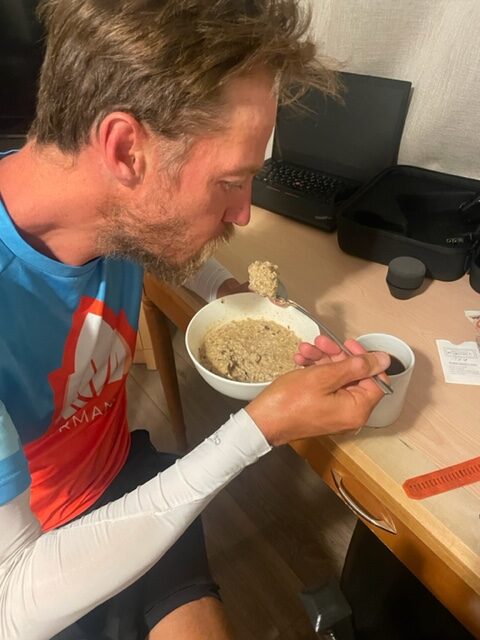
Speaking of energy, was there a calorie target? Something like 9,000 a day?
That was my hope. But good luck with that. That’s force-feeding yourself.
The feedings were mostly bakery items. There’s a tremendous amount of calories in the fat and sugar of loaves and cookies and cinnamon buns. And to be honest with you, you never get tired of them. Well, you get tired of the crappy ones, like Walmart cinnamon rolls — you get tired of them real quick. But you don’t get tired of local bakeries. So crew members would present these warm cinnamon rolls. And with limited comfort out there, that’s something I really enjoyed — good food to fuel me.
I was probably getting 7,000 calories. That’s all I could really take in. At the end I was so sick and tired of eating food. I really did want a salad … the crunch, everything about a salad is glorious.
You put in 50-some days to reach Calgary’s city limits. I was wondering if getting here, getting home, was an emotional lift … or did it feel like a premature finish line and you had to rally to get going again? What was that experience like?
It was loaded. I saw the Calgary skyline of the downtown. I just started breaking into tears. I remember calling Lana Rae on the phone. I was screaming and hooting and hollering, I was so excited and happy — “I ran to Calgary. I’m going to see a lot of familiar faces. I’m going to run down 16th Avenue. I’ve had dinner there. I’ve gone shopping there.” It was beautiful, after a world that was so unfamiliar, to have all that familiarity.
I did a good job of not allowing myself to take in any comfort … I still had another nine days of running — and the Canadian Rockies. It was a reminder that your job’s not done. Don’t take a deep breath yet.
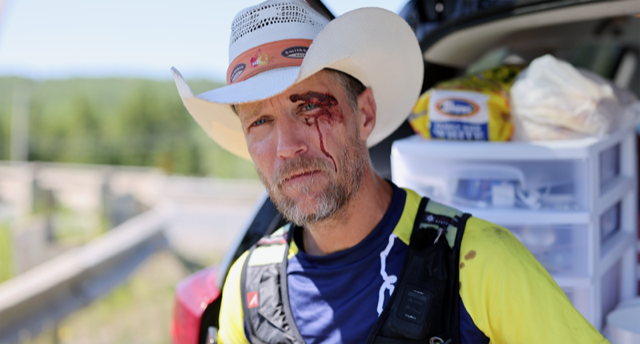
In 30 years, when you’re bouncing grandkids on your knee, what will you tell them? And what will you remember? What will be your enduring takeaway from this?
The fact that you put the work in — not just a training block or months or even years, but decades of work — and it all paid off to do something nearly impossible.
I have a feeling when I’m older I’m going to look back at this and go, “I did what?” I’m already doing that, because realistically, even to me, this doesn’t make sense.
Any big, hairy, audacious goal that my children have, that my grandkids have, I’m living proof that if you stick with it and believe in yourself and put your self-worth first, if you’re resilient and you stick to the plan and you have a good plan, if you have incredible people around you that lift you up — there’s no self-made man here — if you want to do whatever, anything is possible.
It’s not going to be easy, it’s not going to be quick, but you putting the work in will eventually get you there. I’m living proof of that.
